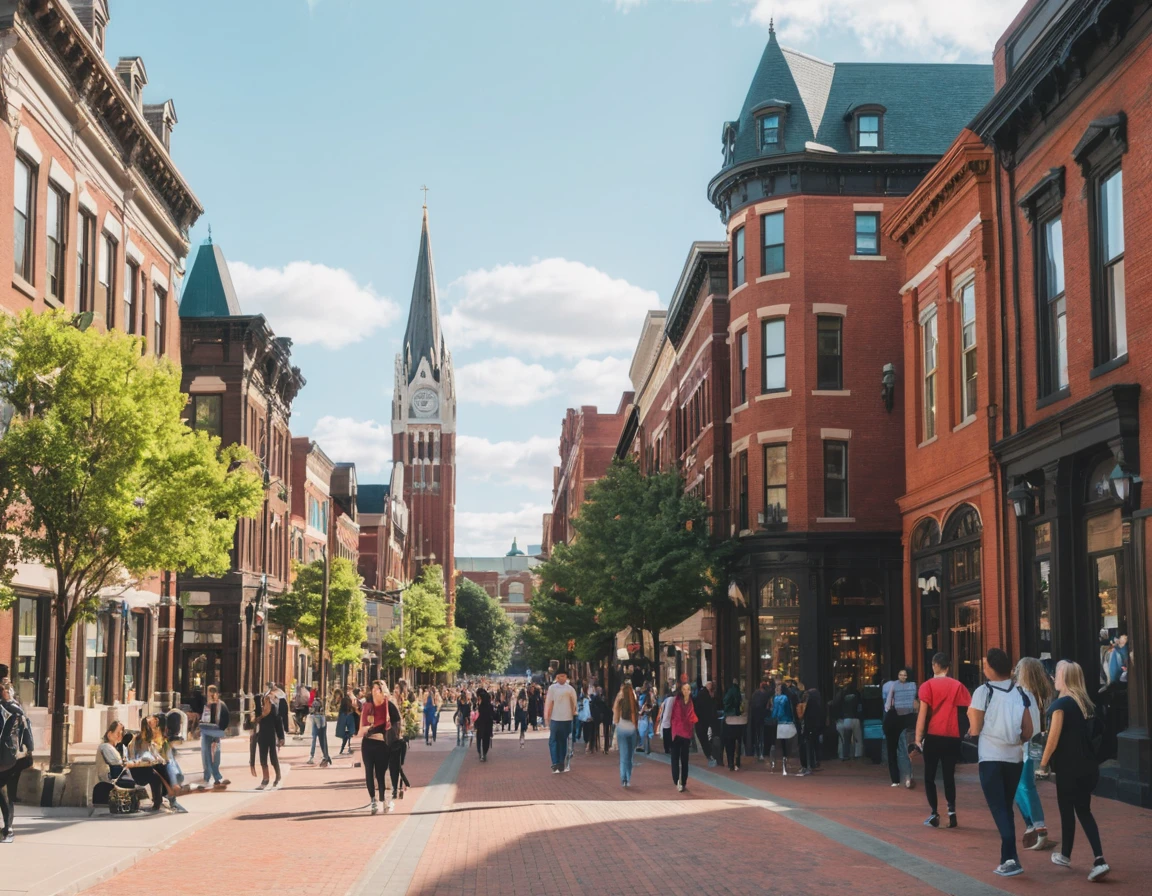Choosing where to study is one of the most crucial decisions a student faces. The decision often boils down to two main options: the vibrant energy of big cities or the calm serenity of small towns. Each setting has its distinct advantages and challenges, significantly influencing a student’s overall experience and academic success.
Why Location Matters
The location not only shapes day-to-day life but also affects academic performance, social opportunities, and personal growth. For example, a student who thrives in lively environments may excel in a bustling city full of cultural diversity and networking opportunities. In contrast, someone who appreciates a quieter, community-focused atmosphere might find their best fit in a small town. Consider a few key factors that differentiate these environments:
- Academic Resources: Big cities often provide access to advanced technology and well-funded educational institutions, enhancing learning.
- Cost of Living: While cities may offer abundant job opportunities, they often come with a higher cost of living compared to small towns, which can be more budget-friendly.
- Social Scope: Urban areas boast diverse populations and countless social encounters, while small towns foster tight-knit communities.
Ultimately, the choice between a big city and a small town can shape a student’s study journey in profound ways, making it essential to weigh the pros and cons thoughtfully. As we delve deeper, let’s explore the specific advantages and disadvantages of each option to help make this pivotal decision.
Pros of Studying in a Large City
When it comes to pursuing higher education, studying in a large city can enhance the overall experience significantly. Thanks to the vibrant atmosphere, cultural diversity, and abundant opportunities, students find themselves immersed in a world of learning and growth.
Diversity and Culture
One of the most compelling advantages of studying in a large city is the rich tapestry of cultures. Students are exposed to:
- Multicultural Environments: Large cities often host a diversity of nationalities and traditions, fostering an inclusive ambiance.
- Cultural Events and Festivals: From food festivals to art shows, students can participate in numerous cultural events that broaden their horizons.
- Access to Global Cuisines: Food lovers can indulge in a variety of international cuisines that reflect the vibrant culture of the city.
Imagine attending a street festival where you can taste foods from around the world or visiting a museum that showcases art from different cultures. Such experiences not only enhance education but also encourage personal development.
Networking Opportunities
In a big city, career prospects are plentiful:
- Job Fairs and Workshops: Cities often host various job fairs and workshops where students can meet potential employers.
- Professional Networks: Students benefit from universities that foster connections with local industries, paving the way for internships and job placements.
- Alumni Events: Networking events with alumni can lead to mentorship opportunities and valuable career advice.
For example, a student pursuing a career in tech might attend a conference where they can meet industry leaders and gain insights into upcoming trends. These networking opportunities are essential for building a robust professional foundation, making a large city an enticing place for students eager to excel academically and professionally.

Cons of Studying in a Large City
While studying in a large city can offer numerous opportunities, it also comes with its fair share of challenges. As students weigh their choices, it’s essential to consider these potential drawbacks to ensure they align with personal preferences and financial constraints.
Higher Cost of Living
One major disadvantage is the significantly higher cost of living. This can be especially burdensome for students on tight budgets. Key factors include:
- Housing Expenses: Rent in a city can take up a large portion of a student’s budget, often making it the most significant expense.
- Everyday Costs: Grocery prices, dining out, and even basic services can be notably more expensive in a city, putting financial strain on students.
- Transportation: While public transport is often available, it can also lead to additional expenses, especially for daily commuters.
For instance, a student living in a metropolitan area might find themselves budgeting for rent that is double or even triple compared to living in a smaller town, potentially leading to financial stress.
Noise and Distractions
Another significant factor to consider is the noise and distractions prevalent in large cities. The bustling streets filled with traffic, construction, and nightlife can be overwhelming. Here’s what students might encounter:
- Study Disruptions: The continuous noise can make it challenging to focus on studies or find a quiet place to work.
- Social Temptations: With numerous events, gatherings, and entertainment options, students may find it difficult to manage their time effectively, leading to distractions from academic commitments.
Imagine trying to concentrate on a research project in a crowded café—this scenario is common in big cities and can significantly impact productivity. In conclusion, while large cities offer unique advantages, it’s vital for students to reflect on whether they are equipped to handle these challenges before making their decision.
Pros of Studying in a Small Town
As students consider their options for higher education, small towns often emerge as appealing choices for those seeking a unique academic experience. These environments provide distinct advantages that can significantly enhance a student’s journey.
Lower Cost of Living
One of the standout benefits of studying in a small town is the lower cost of living. This can greatly alleviate financial stress for students. Key aspects include:
- Affordable Housing: Rent prices are usually much lower than in big cities, allowing students to find comfortable accommodations without breaking the bank.
- Budget-Friendly Dining: Local cafes and restaurants tend to offer inexpensive meals, making it easier to enjoy eating out.
- Transportation Savings: With everything typically within walking or biking distance, students can save on transportation costs, which adds to their overall savings.
For example, a student might find a cozy studio apartment in a small town for the same price as a cramped room in a bustling city. This financial freedom can enable them to focus more on their studies and enjoy local life.
Tight-Knit Community
Another compelling reason to study in a small town is the opportunity to become part of a close-knit community. Students often find:
- Stronger Connections: Smaller populations mean students can form deeper relationships with their peers and professors.
- Supportive Atmosphere: Tight-knit communities often foster an environment where individuals look out for one another, creating a sense of belonging.
- Easy Integration: Engaging with locals can support a smoother transition for international students, helping them feel at home in their new surroundings.
Imagine walking into a local coffee shop where the barista knows your name—a simple interaction that can make a significant difference in a student’s daily life. Overall, studying in a small town can provide a nurturing atmosphere for personal and academic growth.

Cons of Studying in a Small Town
While small towns offer unique benefits, there are notable downsides that students must consider when deciding on their study environment. It’s crucial to weigh these factors alongside the advantages.
Limited Entertainment Options
One challenge students often face in small towns is the limited range of entertainment options. This can affect the overall college experience in various ways, such as:
- Fewer Cultural Events: Smaller towns typically have fewer music festivals, art exhibitions, and theatrical performances, which can be disappointing for students seeking vibrant cultural experiences.
- Limited Dining and Nightlife: Options for restaurants, cafes, and nightlife venues can be sparse, potentially leading to a more monotonous social life.
- Lack of Recreational Facilities: Smaller towns might not offer extensive recreational facilities like gyms, cinemas, or sports complexes, which can limit ways for students to unwind and socialize.
Imagine studying in a place where the local entertainment options are so limited that you might have to travel to a neighboring city just to catch a new movie!
Fewer Job Opportunities
Another significant downside is the availability of job prospects:
- Limited Job Market: Smaller towns often lack the diverse job opportunities found in larger cities, making it more challenging for students to secure part-time work or internships.
- Narrow Industry Focus: If the local economy is concentrated in specific industries, students may find it difficult to gain relevant experience in their field of study, which can impact future job prospects.
- Less Networking: With fewer professionals and businesses, there are fewer chances to build a professional network that can assist in career advancement.
For instance, a business student in a small town might struggle to find internships related to their field when larger cities offer a plethora of options, affecting their resume and future career potential. In summary, while small towns have their own charm, students should consider these limitations carefully to ensure they align with their personal and academic goals.
